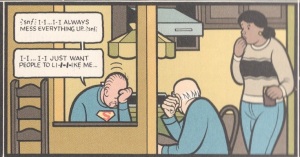Uncomfortable Empathy: Jimmy Corrigan – The Smartest Kid on Earth
What the hell is it about “Jimmy Corrigan: The Smartest Kid on Earth” that takes a straightforward, but sad story and drives it to the edge of cripplingly depressing? This question dangled throughout my reading, and it wasn’t until close to the end of the book that I finally got an answer in the form of Jimmy stuttering out “I-I… I-I just want people to li-i–i-ike me…”
As simple as the story is (though maybe not so straightforward) the goal of the main character(s) is just as straightforward too: the Jimmys just want to be liked. At a basic level, we all just want to be liked – maybe not by everyone, but at least by someone, and Jimmy appears to have no one by the end of the story. Jimmy Corrigan embodies our fears of loneliness, but again, the question is “how?” If not because of the fact that it takes more than an author just announcing how a character feels (the old “show vs. tell” argument) then simply because of the fact that I was depressed way before Jimmy vocalized this thought of his.
The basic technique by which Chris Ware crafts his story is by playing up the tiny moments of day to day life. “If Jimmy just wants to be liked and isn’t, why is that?” in answering that question, or attention is drawn to the elements that make Jimmy’s character: for instance, in the above picture the tag of Jimmy’s shirt is sticking out. Awkward. Jimmy is balding, at one point his clothes don’t fit him quite right, his attempts at comforting his newfound sister are not accepted like he’d hoped… All of these things could just as easily happen to us: clothes get ruined, failure at comfort, balding, etcetera.
Then there are the elements of irony throughout the book, where one of the Jimmys is painfully unaware of what is happening in the world around him. The young grandfather thinks that his lead horse is beautiful, but it turns out it’s not, and the young Jimmy of the present day doesn’t realize that his hero has just cut and run after sleeping with his mom. These examples on their own are sad, and were it only for these two instances, perhaps readers could rationalize it away, mumbling something about how innocent or unclear childhood can seem, but no. On the other end of life, stand, again, grandfather Corrigan and Jimmy’s dad. In one flashback Jimmy’s dad shoes his dad out the door after he’s made a comment about “colored people.” This scene serves a dual purpose: first it shows that in old age grandfather Corrigan is still alienated from and awkward around other people, but it also adds the sad element of showing to readers that Jimmy’s dad was once a bit more aware of those around him. Now, in the present day when he’s met his son, Jimmy’s dad is painfully unaware of Jimmy’s lack of a girlfriend, how uncomfortable the comments he’s made about the women he’s slept with are, and his attempts to connect with Jimmy the way that he was able to connect with his daughter (via the bacon words) is acknowledged, but never quite accepted as a bonding element. It is by playing on our fears of alienation and awkwardness that Chris Ware gets readers to relate to Jimmy Corrigan and feel quite depressed in doing so.

I don’t think that Ware’s intent is a sadistic manipulation of form.
Ware is giving a portrait of the cripplingly low self-esteem Jimmy feels after having been raised by a mother who believes he exists to do whatever she wants of him, and after the abandonment of his father. He doesn’t choose to be this way. His struggle is just to feel connected, much less normal. And the rage he feels towards his father, mixed with the love he wants from his father, is a confusing storm at best. But an understandable one.
The book is not out to cripple the reader—the book is out to show how people are crippled.